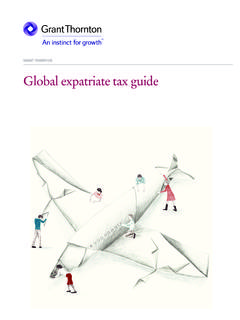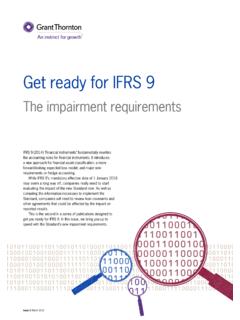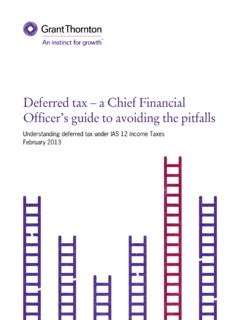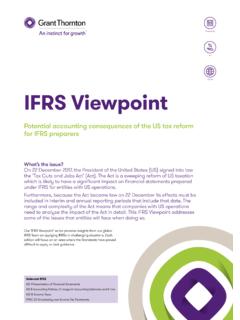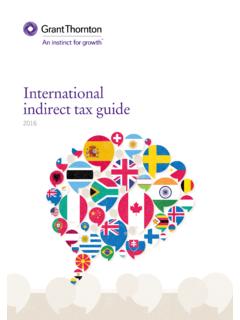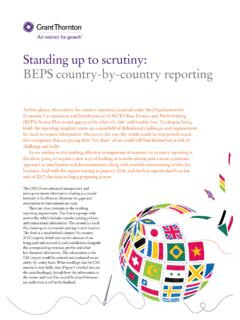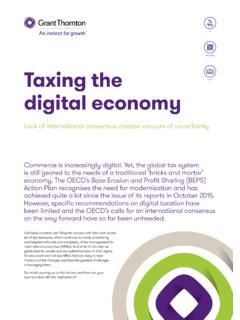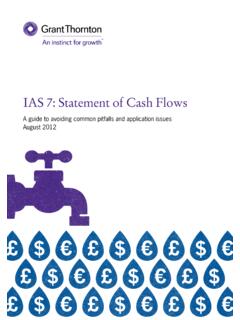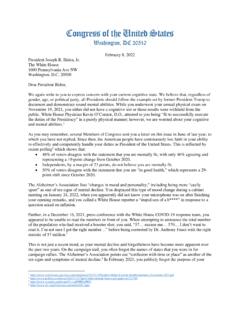Transcription of IFRS Viewpoint 7 - When the going concern basis is not ...
1 ifrs ViewpointGlobalAccountingTa xRelevant IFRSIFRS 5 Non-current Assets Held for Sale and Discontinued OperationsIAS 1 Presentation of Financial StatementsIAS 10 Events after the Reporting PeriodIAS 37 Provisions, Contingent Liabilities and Contingent AssetsPreparing financial statements when the going concern basis is not appropriateOur ifrs Viewpoint series provides insights from our global ifrs team on applying IFRSs in challenging situations. Each edition will focus on an area where the Standards have proved difficult to apply or lack s the issue?
2 Both IAS 1 Presentation of Financial Statements and IAS 10 Events after the Reporting Period suggest that a departure from the going concern basis is required when specified circumstances exist. Neither Standard however provides any details of an alternative basis of preparation and how it may differ from the going concern basis . Entities will therefore need to develop an appropriate basis of preparation. This ifrs Viewpoint addresses some of the issues that entities will face when doing 1 states When preparing financial statements, management shall make an assessment of an entity s ability to continue as a going concern .
3 An entity shall prepare financial statements on a going concern basis unless management either intends to liquidate the entity or to cease trading, or has no realistic alternative but to do so. When an entity does not prepare financial statements on a going concern basis , it shall disclose that fact, together with the basis on which it prepared the financial statements and the reason why the entity is not regarded as a going concern (IAS ).IAS 1 appears then to suggest that a departure from the going concern basis is required when the specified circumstances exist.
4 This is confirmed by IAS 10 which states that an entity shall not prepare its financial statements on a going concern basis if management determines after the reporting period date either that it intends to liquidate the entity or to cease trading, or that it has no realistic alternative but to do so. (IAS ).Neither IAS 1 nor IAS 10 provide any details however of any alternative basis and how it might differ from the going concern basis . Management should then choose accounting policies that will result in the most relevant and reliable financial information.
5 Entities will therefore need to give careful consideration as to the appropriate basis of preparation bearing in mind their own specific circumstances. The purpose of this Viewpoint is not to provide guidance on determining whether an entity is or is not a going concern but to provide insights on the matters to be considered when a going concern basis is not appropriate. Background 2 ifrs Viewpoint 7: June 2018 Objective of financial statements when not prepared on a going concern basisSeveral points are relevant to the objective of financial statements that are not prepared on a going concern , there is no general dispensation from the measurement, recognition and disclosure requirements of ifrs if the entity is not expected to continue as a going concern .
6 Our preference then is to use the normal recognition and measurement requirements of ifrs as the starting point for accounting and only deviate from these where adequate justification exists, for example arising from events after the reporting date. A second point is that each situation needs to be assessed on its own facts and circumstances as some entities in a non- going concern situation will be closer to liquidation or ceasing trading than others. The accounting will typically reflect this. For example, when an entity is in the process of being liquidated or will be liquidated imminently, the financial statements might be prepared under what is sometimes referred to as a break-up basis or liquidation basis .
7 Some people argue that under such a break up basis , the objective of the financial statements changes from reporting financial performance to consideration of matters such as: whether the assets are sufficient to satisfy the entity s creditors quantification of the amount of any surplus that may be available for distribution to the shareholders (ie what the value of the entity will be when it is broken up into its separate parts on liquidation). This is important as under such a break-up basis , provision would be made for losses subsequent to the reporting period and for the costs of winding up the business irrespective of whether an irrevocable decision to terminate the business had been made at the end of the reporting period.
8 Assets would also be restated to their actual or estimated sale proceeds even if this was different from their fair value at the end of the reporting period. Analysis ifrs Viewpoint 7: June 2018 3 TerminologyThe terms break-up basis and liquidation basis are not defined terms that are used in ifrs but are ones that are used informally. Break-up basis is used in some countries to signify that an entity is at a stage where its assets are being realised or are about to be realised as part of the process of liquidating the entity.
9 In other countries the terms liquidation basis or an orderly realisation basis are used and are broadly equivalent in nature. An informative description of the preparation basis adopted will often be more important than the label attributed to it. It is also worth noting that both IAS and IAS use the phrase cease trading . This phrase is used in the sense of an entity which is no longer involved in the activity of buying and selling goods and services. It should not be confused with a situation where an entity which is listed on a stock exchange has its shares suspended from trading.
10 Measurement of assetsWriting down assetsIt will always be appropriate to consider the need to write down assets for impairment when a company intends to liquidate the entity or to cease trading. For instance, when financial statements are prepared on a going concern basis , a non-financial asset may be stated at an amount which is greater than its net realisable value provided that it is no greater than its recoverable amount. 4 ifrs Viewpoint 7: June 2018 Our viewThe fact that a going concern basis is inappropriate does not automatically mean that a break-up basis (see terminology on page 3) is appropriate.
